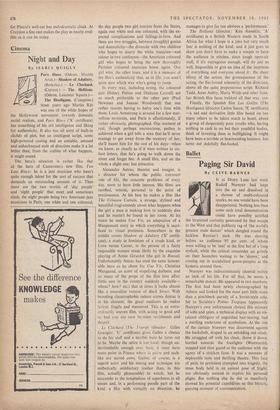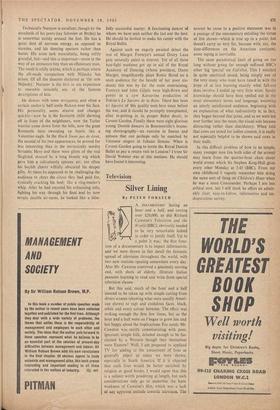Ballet
Paging Sir David
By CLIVE BARNES
IF at Drury Lane last week Rudolf Nureyev had leapt into the air and dissolved in a shower of multi-coloured sparks, no one would have been disappointed. Nothing less than some such total demonstration could have possibly satisfied the irrational curiosity generated by that escape to the West and that publicity tag of 'the world's greatest male dancer' which dangled round the luckless Russian's neck. He was dancing before an audience 95 per cent. of Whom were willing to be 'sent' at the first bat of a long eyelash, while the critical remainder sat grimly on their haunches waiting to be 'shown,' and coming out in scandalised goose-pimples at the hysteria around them.
Nureyev was indiscriminately cheered within an inch of his life. For all that, he seems a remarkable dancer. He appeared in two numbers. The first had been newly choreographed by Ashton and looked for the most part little more than a pinchbeck parody of a Soviet-style solo. Set to Scriabin's Paine Tragique (apparently Nureyev's own unfortunate choice) this mixture of sobs and spins, a technical display with an un- related obbligato of anguished hair-tearing, had a startling undertone of symbolism. At the rise of the curtain Nureyev was discovered against the backcloth, draped in an enfolding red cloak. He struggled off with his cloak, threw it down, hurtled towards the footlights (Westwards), stopped and then gazed at the audience with the agony of a stricken faun. It was a moment of deplorable taste and thrilling theatre. This face of pain, its prettiness crumpled into tragedy, the tense body held in an animal pose of fright, too obviously seemed to exploit his personal plight. But nothing else he did so manifestly showed his potential capabilities as this blatant, piercing moment of communication. Technically Nureyev is excellent, though by the standards of his peers (say Soloviev or Bruhn) he is somewhat untidy around the feet. He has a great deal of nervous energy, as opposed to stamina, and his dancing sputters rather than burns. His arms lack masculinity, being softly graceful, but—and this Ls important—more in the way of an immature boy than an effeminate man. The result is oddly sexless, which is perhaps where the oft-made comparison with Nijinsky has arisen. Of all the dancers docketed as 'the new Nijinsky,' Nureyev is the first in my experience to resemble remotely any of the famous descriptions of him.
He dances with some arrogance, and often a certain sardonic half-smile flickers over his face. His personality seems elusive and changes quickly—now he is the favourite child showing oft in front of the neighbours, now the Tartar warrior come down from the hills, now the great Romantic hero swooping up hearts like a, Valentino eagle. In the Black Swan pas de deux, the second of his two appearances, he proved far less interesting than in the intrinsically tawdry Scriabin. Here and there were glints of the real Siegfried, doused by a long blonde wig which gave him a ridiculously epicene air; too often his boyish charm wilfully obscured his deeper gifts. At times he appeared to be challenging the audience to cheer the circus they had paid for, cynically cracking his body like a ring-master's whip. After he had encored his exhausting solo, fighting his way through his final and by now erratic double air-turns, he looked like a bliss- fully successful martyr. A fascinating dancer of whom we have seen neither the last nor the best. He should be invited to make his career with the Royal Ballet.
Against such an eagerly awaited debut the rest of Margot Fonteyn's annual Drury Lane gala naturally paled in interest. Yet of all these bun-fight matinees got up in aid of the Royal Academy of Dancing (whose president, Dame Margot, magnificently plays Robin Hood on a snob audience for the benefit of her poor stu- dents) this was by far the most entertaining. Fonteyn and John Gilpin were high-flown and poetic in a new Karsavina production of Fokine's Le Spectre de la Rose. There has been n) Spectre of this quality seen here since before the war, and it should be promptly transplanted, after re-potting in its proper Bakst decor, to Covent Garden. Finally there were eight glorious young Danish dancers in Bournonville's bounc- ing choreography—an exercise in finesse and aptness that can perhaps only be matched by Viennese singers in Johann Strauss. When is Covent Garden going to invite the Royal Danish Ballet to pay a return visit to London? I trust Sir David Webster was at this matinee. He should have found it interesting.











































 Previous page
Previous page